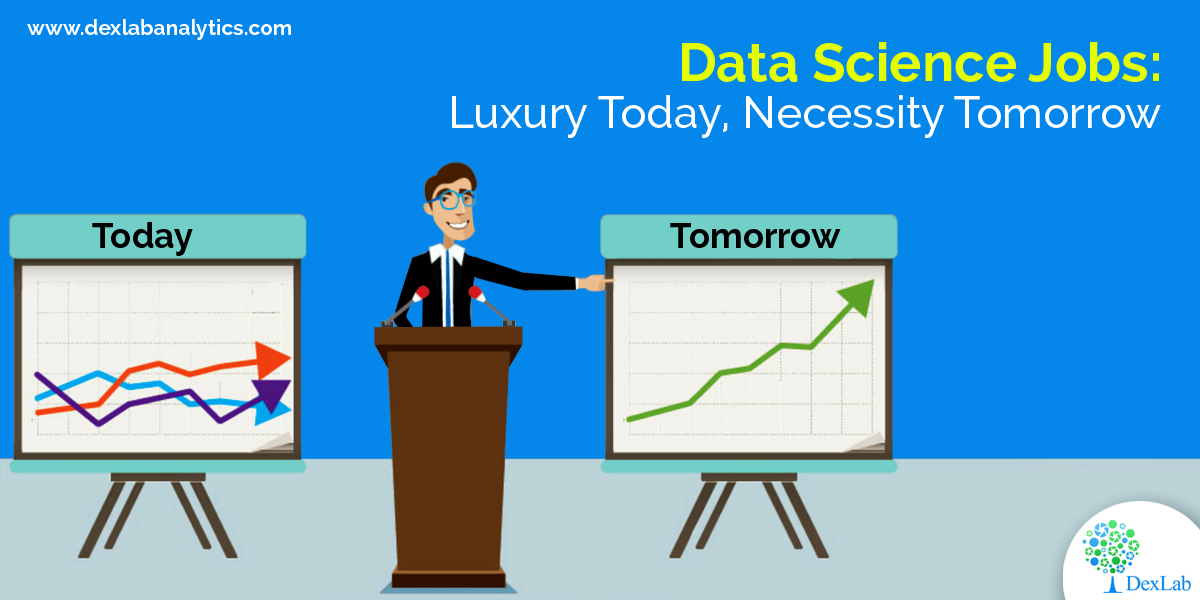A general consensus: the scene of employment is changing. The jobs in data science are spiking up, and at a robust rate. According to World Economic Forum in 2016, a nuanced state of affairs with employment fluctuations is likely to happen across sectors, jobs and geography in the coming years – hold your horses and wait with bated breath!
Job Opportunities till 2020
A wide set of factors are expected to bring upon different effects on the varying segments of employment market till 2020. For an instance, recent demographic stats in the emerging job market are likely to ace up employment by 5% approx worldwide. On the other side, the surging geopolitical instability across the globe could reduce employment by 2.7%. Amidst this, artificial intelligence, touted as a replacement key for manpower is likely to have a minute effect on job reduction by a mere 1.5%.
Considerably, the overall figure points that the computing and mathematical jobs are going to increase by 3.2% – because a sturdy compilation of technological and geopolitical instability effect is expected to generate an altogether positive effect across various employment chains, suggesting the instability will in return result in a higher demand for programming, computing and modeling.
However, recruitment procedure is going to get more challenging.
Across every sector and every job family the perception is that recruitment will be more challenging in future #ai #sasacademic
Lower University application rates
Following the latest trends, the applications to universities by students have taken a halt – in UK, the number of people applying to universities has fallen drastically – the reason anticipated is the result of Brexit.
But irrespective of any reason, lower application rate is going to affect graduate recruitment. The emergence of a gig economy is largely considered a positive effort, but a lack of benefits like annual leave may cause some hindrance in the effectuality. Also, AI is resulting in a less number of job generation, the automation of entry-level jobs mean lesser jobs.
Hone your skills further after employment
While undergraduates and postgraduates eyes employment as the end of their education, for employers it’s an entirely different ball game. For them, employment is the just a stepping stone in the process of ongoing training to make sure the fresh workforce develops cutting-edge skills. This stands true especially in complex job areas of data science, where a shortage of graduates exists. As a result, motivate your existing workforce to develop required data analytics skills in the most accomplishing way to garner expertise and thorough know-how.
The most desirable quality in a new #DataScience hire is their dedication to continually learn more. #sasacademic #ai
To get the best kind of data science online training, drop by DexLab Analytics Delhi – it is a prime learning platform in India that helps you remain up-to-date with the latest tools and trends. The field of data analytics is evolving rapidly and continuing professional development is the need of the hour.
Source – blogs.sas.com
Interested in a career in Data Analyst?
To learn more about Data Analyst with Advanced excel course – Enrol Now.
To learn more about Data Analyst with R Course – Enrol Now.
To learn more about Big Data Course – Enrol Now.To learn more about Machine Learning Using Python and Spark – Enrol Now.
To learn more about Data Analyst with SAS Course – Enrol Now.
To learn more about Data Analyst with Apache Spark Course – Enrol Now.
To learn more about Data Analyst with Market Risk Analytics and Modelling Course – Enrol Now.
Advanced Analytics and Data Science, Artificial Intelligence, data science, Data Science Certification, Data Science Classes, Data Science Courses, data science online learning, Data Science training, Data Science training institute, SAS Academic, sas analytics course, sas certification, Sas course, Sas training centre, SAS training courses, Sas training institute


Comments are closed here.